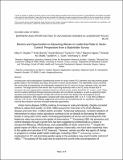| dc.description.abstract | Increasing the active participation of professional women in vector control (VC) activities may help promote greater gender equity in the workplace and reduce the burden of vector-borne diseases. This stakeholder survey examined the current roles and perspective of professionals employed in the VC sector in Kenya, Indonesia, India, and other countries. The largest barriers that women face in pursuing leadership roles in the VC sector include lack of
awareness of career opportunities, limitations based on cultural norms, and the belief that VC is men’s work. These barriers could be addressed through improving education and recruitment campaigns, as well as supporting higher education and mentoring programs. Females were almost six times more likely to be encouraged to pursue leadership positions in their organization compared with male respondents (OR = 5.9, P > 0.03, 95% confidence interval: 1.19, 29.42). These findings suggest that once women are recruited into the VC workforce, they face minimal discrimination and have increased leadership opportunities. | en_US |

